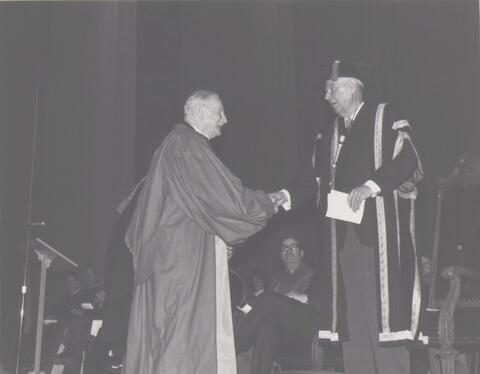
Zone du titre et de la mention de responsabilité
Titre propre
Honourary Degrees - Presentation - Richard St. Barbe Baker
Dénomination générale des documents
- Document graphique
Titre parallèle
Compléments du titre
Mentions de responsabilité du titre
Notes du titre
Niveau de description
Pièce
Cote
Zone de l'édition
Mention d'édition
Mentions de responsabilité relatives à l'édition
Zone des précisions relatives à la catégorie de documents
Mention d'échelle (cartographique)
Mention de projection (cartographique)
Mention des coordonnées (cartographiques)
Mention d'échelle (architecturale)
Juridiction responsable et dénomination (philatélique)
Zone des dates de production
Date(s)
-
6 Nov. 1971 (Production)
Zone de description matérielle
Description matérielle
1 photograph : b&w ; 22 x 28 cm
Zone de la collection
Titre propre de la collection
Titres parallèles de la collection
Compléments du titre de la collection
Mention de responsabilité relative à la collection
Numérotation à l'intérieur de la collection
Note sur la collection
Zone de la description archivistique
Nom du producteur
Historique de la conservation
Portée et contenu
John G. Diefenbaker, University Chancellor, making presentation of an honourary Doctor of Laws degree to Richard St. Barbe Baker at fall Convocation held in Centennial Auditorium.
Bio/Historical Note: Born 9 October 1889 near Southhampton, England, Richard Edward St. Barbe Baker was educated at Dean Close School, Cheltenham; Emmanuel College, University of Saskatchewan; and Cambridge University where he completed forestry studies. Following service in World War I, and a brief stint with the British civil service, Baker was appointed Assistant Conservator of Forests in Kenya. There in 1922 he founded the Men of the Trees, enlisting the help of 9,000 voluntary tree planters in an attempt to arrest the invading Sahara. This society, which grew into an international organization, became the central cause of Baker’s life. He became a renowned forestry consultant, and over the years was called upon to advise governments in many nations on forestry and conservation matters, including Palestine, New Zealand, the United States, Africa, and India. Baker also was active in promoting international co-operation and was involved in preparations for the first World Forestry Congress held in Rome in 1926. In addition to his extensive forestry and conservation activities, Baker wrote and published widely and has more than thirty books and scores of articles to his credit. While much of his writing is autobiographical in nature, he also wrote about tree, forestry and conservation concerns, spiritual and religious topics, health matters, and horses, and also produced some material specifically for children. Throughout Baker’s life he was in demand as a public lecturer, speaking to numerous audiences in many countries, and gave talks in schools all over Britain and New Zealand. Baker’s radio talks were featured on the BBC in Britain, and he was also heard on radio in the United States, New Zealand, Australia, Canada, and Africa. Beyond his forestry and literary activities, he was strongly involved with the Baha'i Faith, and was a proponent of healthful living. He received an honourary Doctor of Laws degree from the University of Saskatchewan in 1972, and in 1977 the Order of the British Empire was bestowed upon him. In 1959 Baker lived in New Zealand until his death on 9 June 1982 in Saskatoon while visiting the University of Saskatchewan. He was 92 years old.

